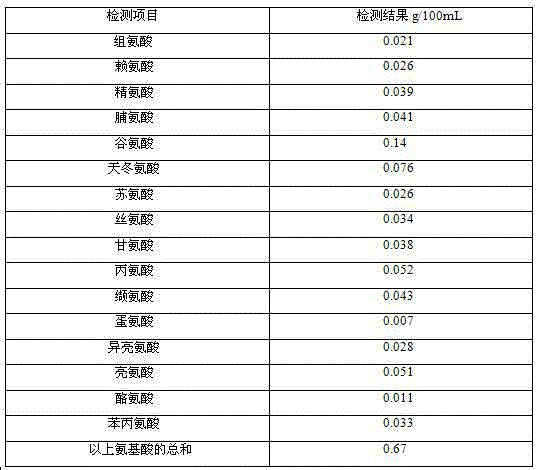Process for brewing Hakka winter wine
A technology of Hakka winter wine and craftsmanship, which is applied in the preparation of alcoholic beverages and other directions, can solve the problems of short fermentation time, insufficient utilization of rice nutrition, and lack of nutrients.
- Summary
- Abstract
- Description
- Claims
- Application Information
AI Technical Summary
Problems solved by technology
Method used
Image
Examples
Embodiment 1
[0028] Brewing starts in November, the steps are as follows:
[0029] (1) Washing and soaking: wash the raw materials with clean water and soak for 4 hours;
[0030] (2) Steaming: steaming the raw materials for 130 minutes;
[0031] (3) Cooling: Spread the glutinous rice on a cooling bed and cool down to 30°C;
[0032] (4) Mixing koji: Mix water with 2% red koji, 3% wheat koji, and 1% koji, and stir evenly;
[0033] (5) Saccharification:
[0034] Early stage of saccharification: add the raw materials mixed with koji and 0.5% glucoamylase into the wine jar at a temperature of 28°C, the height of the wine jar is 55 cm, and the width is 40 cm;
[0035] Mid-saccharification stage: add a small amount of koji, let it stand for 30 days, and keep the ambient temperature at 16°C;
[0036] Late stage of saccharification: add to keep the ambient temperature at 25°C and let stand for 155 days;
[0037] (6) Alcoholization: Aging: leave the liquor to stand, the temperature is naturally...
Embodiment 2
[0043] Brewing starts in November, the steps are as follows:
[0044] (1) Washing and soaking: wash the raw materials with clean water and soak for 5 hours;
[0045] (2) Steaming: steaming the raw materials for 125 minutes;
[0046] (3) Cooling: Spread the glutinous rice on a cooling bed and cool down to 25°C;
[0047] (4) Mixing koji: Mix water with 2% red koji, 3% wheat koji, and 1% koji, and stir evenly;
[0048] (5) Saccharification:
[0049] Early stage of saccharification: add the raw materials mixed with koji and 0.5% glucoamylase into the wine jar at a temperature of 26°C, the height of the wine jar is 55 cm, and the width is 40 cm;
[0050] Mid-saccharification stage: add a small amount of koji, let it stand for 30 days, and keep the ambient temperature at 18°C;
[0051] Late stage of saccharification: add to keep the ambient temperature at 27°C and let stand for 150 days;
[0052] (6) Alcoholization: Aging: leave the liquor to stand, the temperature is naturally...
PUM
 Login to View More
Login to View More Abstract
Description
Claims
Application Information
 Login to View More
Login to View More - R&D
- Intellectual Property
- Life Sciences
- Materials
- Tech Scout
- Unparalleled Data Quality
- Higher Quality Content
- 60% Fewer Hallucinations
Browse by: Latest US Patents, China's latest patents, Technical Efficacy Thesaurus, Application Domain, Technology Topic, Popular Technical Reports.
© 2025 PatSnap. All rights reserved.Legal|Privacy policy|Modern Slavery Act Transparency Statement|Sitemap|About US| Contact US: help@patsnap.com


